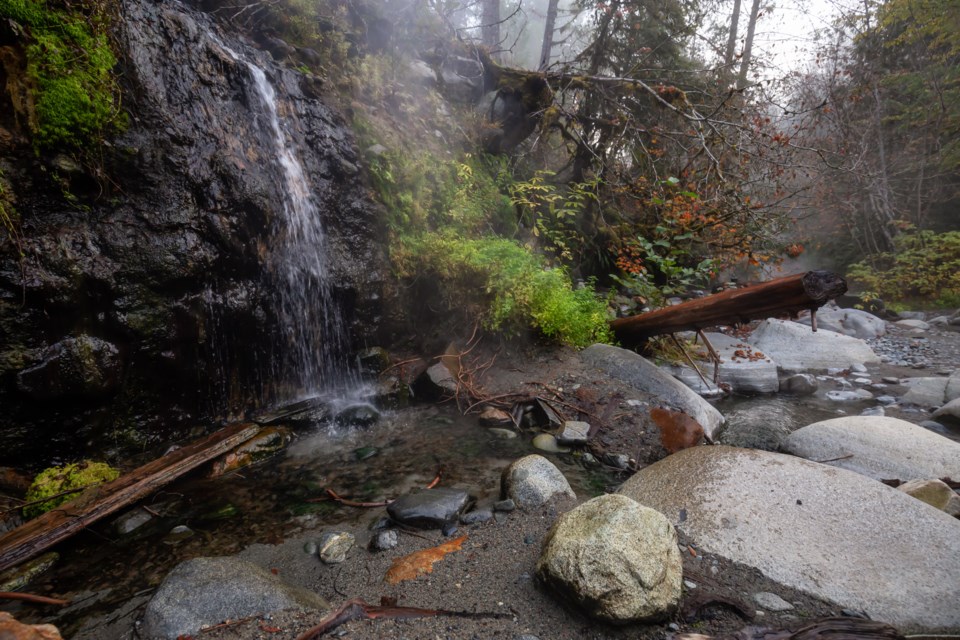Xa'xtsa First Nation (also called the Douglas First Nation) has seen a rise in visitors disrespecting Sloquet Hot Springs and its adjacent campground, prompting new messaging from the Nation. The hot springs are sacred to the Xa’xtsa people and used as a place for spiritual cleansing.
A campfire ban was put in place on Sunday, July 7 at Sloquet Creek FSR recreational site. Hosts decided banning fires would protect public safety, citing “extreme heat and dry conditions” at the site as their reasons.
A province-wide campfire ban was enacted midday on Friday, July 12 as B.C. continues to feel the heat.
Darryl Peters is business manager for TTQ Economic Development Corporation, a Xa’xtsa First Nation business arm. Peters is also a recovering Chief and councillor for the Nation. He said hosts pay attention to their surroundings before making the call to introduce a fire ban.
“Our land and resources are quite important to us because we have been here since time out of mind. Whether there is a campfire ban or not, we pay attention to the elements around us,” he said. “Once our campground manager notices that it is dry to the point that it’s not safe, he’ll put out a campfire ban.”
A fire on the Lower Lillooet River FSR on Monday, July 8 assured hosts they made the right decision.
“It just shows how dry it is out there. It can cause a fire,” said Peters. “We feel very strong in ensuring that our ban gets out there. I know a lot of people are a little upset about it. We can either stop campfires or we can close the campground until it is safe enough to open up again.”
There is a growing call for chief and council to close the area to the public as Instagram posts and TikToks attract tourists in droves.
“Some of our members say that it’s time to shut it down now,” said Peters. “At any given time, we can just turn around and shut it down. We are allowing this ignorance. We are giving a certain leeway.”
He explained to Pique that visitors have been disrespecting the sacred site.
“Before I was elected chief, we used to come up here. A goal that I had back then was to clean up all of these campers’ garbage,” he said. “We have been struggling for decades with campers who just don’t seem to give a darn. Every provincial campground has the same rule. If you pack it in, you pack it out. That’s how this campground is supposed to run.”
Peters added people often clog the septic system at the campground with trash. “Garbage cans and outhouses are provided,” he said. “When the garbage is full, people throw trash down the tube of human sludge in the outhouse. We have to pay a company to come in to pump the septic system. The garbage that is in the outhouse tubes clogs up the machinery that sucks out the sludge. It gets very expensive.”
A sanitation notice on the board outside the springs also urges people to use the outhouse before entering the pools. In recent weeks, visitors raised concerns about toilet paper scattered around the site. Cans, cigarette butts and tampon applicators also ruined the natural beauty of the place.
Peters said groups often party at the campground, completely disregarding the rules.
“Picnic tables were provided, and they were meant to stay in the one spot. When fire rings were provided, they were supposed to stay in the one spot,” he said. “We get party people that come in and they want to put three or four fire rings all together so they can have a bigger fire.”
Clearing the rubbish is a full-time job, and “it was getting ridiculous,” said Peters. “It’s like people are bringing their household garbage here. In one week, we would come out of the campground with two truckloads of garbage. That’s just in seven days. We get everyone else’s garbage.”
He urged people visiting the site over the warm summer seasons to pack out what they pack in. “You have a responsibility to clean up after yourself,” he said. “That’s a human thing to do. It doesn’t matter what race you are.”
The main use of the site as a place of spiritual cleansing was pushed aside along the way. “We have an agreement with the government to allow people to camp here,” said Peters. “It was established for loggers so they didn’t have long travels. This was one of the places they chose. It just happens to be above a sacred site of spiritual cleansing for our people.”
When asked if members still have time and space to use the springs, Peters firmly said no.
“It’s just too full,” he said. “We clean up everyone else’s garbage because it won’t get done otherwise.”
A nearby hot springs has directly seen the consequence of irresponsible use. The Lilwatatkwa7 trail to Keyhole Hot Springs was closed in November 2023 due to the extreme risk of rockfall, treefall, debris flows and landslides on steep slopes. The trail and hot springs are typically already closed from April 1 to Nov. 15 each year. The most recent closure is due to increased wildlife conflicts caused by recreational users. It will remain in place indefinitely. It also supports the protection of important cultural values, biological diversity, wildlife habitat, sensitive/rare/and at-risk species, and Lil’wat citizens’ ability to carry out traditional use practices.
Lil’wat Chief Dean Nelson previously told Pique he feared the cultural site would soon become like Joffre Lakes. “That was where [the hot springs were] going,” Nelson said, adding that, when natural spaces become commodities, “I think that’s when the abuse comes in, and it wrecks it for everyone.”




